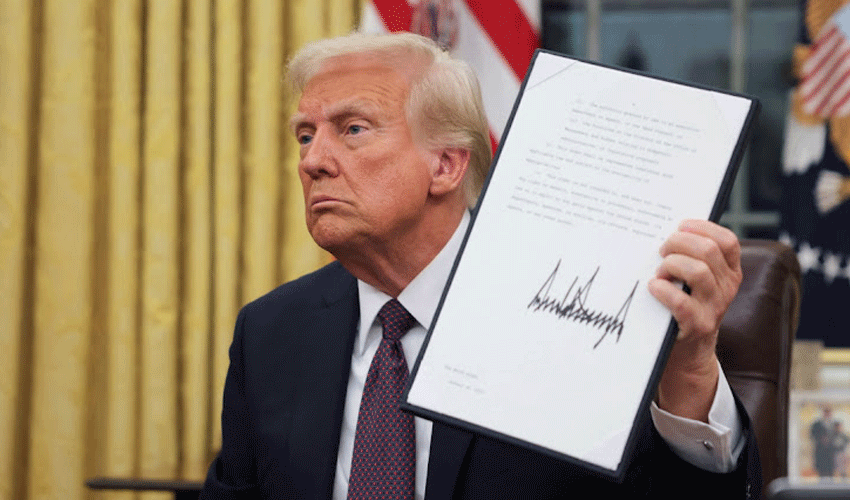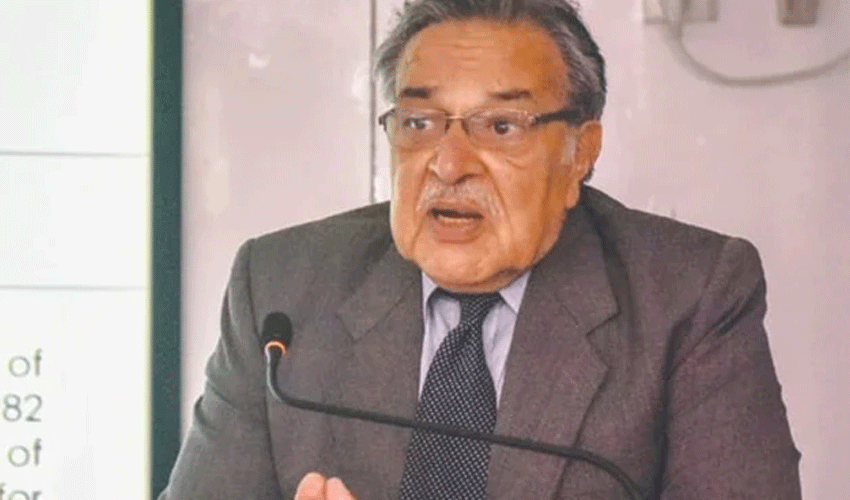The Supreme Court has resumed the hearing of multiple petitions against the Practice and Procedure Act. A full court bench of the Supreme Court, headed by Chief Justice of Pakistan (CJP) Justice Qazi Faez Isa, is hearing the petitions.
MQM counsel Faisal Siddiqui referred to Justice Ayesha Malik’s question if the word “law” in Article 191 gave parliament the authority to legislate.
Justice Malik interjected that the question was whether “subject to law” meant an act of parliament. At this, CJP Qazi Faez Isa requested fellow bench members to first let the lawyer complete his arguments.
At this point, the MQM announced its support for the Supreme Court (Practice and Procedure) Act. The party’s lawyer requested for dismissing applications against the law. He remarked that the applications against the law are maintainable and should be dismissed on merit.
If “law” means an act of parliament, the Constitution’s authors would have written the same, Justice Malik remarked.
CJP Isa-Justice Muneeb Akhtar exchange
Justice Ijazul Ahsan then said he wanted to ask a question. The CJP then told the lawyer not to answer every question and just focus on his arguments.
“I request my fellow judges to hold their questions,” CJP Isa remarked. “Everyone in the bench wants to ask questions, but let the lawyer complete his arguments at least.”
Also Read: Parliament legislated with good intentions: CJP Isa on Practice and Procedure Act
Despite four hearings, he went on to say, it is the court’s performance that just one case is not complete, he added.
Lawyer Faisal Siddiqui said the Supreme Court rules mention the definition of law, adding that at the time of framing of the Supreme Court rules, there was no ambiguity as to what was meant by law.’
CJP Isa and Justice Muneeb Akhtar then got into a little argument over asking questions from the lawyer.
Justice Akhtar directed the lawyer to focus on the question, to which the chief justice remarked that it was the right of the lawyer whatever arguments he wants to present.
“It is also my right to question as a judge sitting on the bench,” Justice Akhtar responded. “I'm sorry if I'm being snubbed again and again, it's not correct.”
Despite being stopped, Justice Akhtar asks lawyer Faisal Siddiqui to only answer what “law” meant in Article 191.
“If you have already made up your mind, write it in the judgement,” CJP Isa said to Justice Akhtar, who said his problem was his question, and sought its answer.
Interference with Supreme Court functions
Justice Ijazul Ahsan asked if the law interfered with the internal working of the Supreme Court or not.
Parliament cannot legislate to reduce the powers of the Supreme Court, said Faisal Siddiqui, adding that this principle hasn’t been affected by the law.
Is the authority given to the Supreme Court in Article 191 final? Justice Musarrat Hilali asked, further questioning if there was scope for legislative intervention in it.
The Act interfered with the independence of the Supreme Court, Justice Ahsan remarked. At this, the lawyer said the Act could not be seen as an interference in the internal affairs of the Supreme Court.
Do the legislative entries authorise parliament for supervision on the Supreme Court, asked Justice Muneeb Akhtar.
Justice Mansoor Ali Shah said if Article 191 is read with legislative entry 58 then parliament had the complete power to legislate.
Faisal Siddiqui then referred to past judgement authored by Justice Akhtar, Justice Jamal Mandokhel, and Justice Hassan Azhar Rizvi and read them out.
CJP Faez Isa said that on a lighter note, he wanted to pay tribute to the lawyer for trying to conflate the very different views of the judges.
Justice Shah commented that the law talked about sending the appeal before a larger bench.
When Siddiqui referred to Justice Malik’s verdict in a high court regarding right to appeal, she said the issue here was appeal against the Supreme Court’s decision itself.
Justice Athar Minallah asked that if Article 175 was read with entry 55, does parliament not have the authority to extend judicial jurisdiction? Justice Ahsan asked that would it not be akin to an amendment to the Constitution if this is done through simple legislation?
The authority to make rules has been given to the Supreme Court, advocate Faisal Siddiqui continued his arguments after a break, adding that however, making the rules has been conditioned by the law.
Justice Mazahar Naqvi asked what those requirements were on the basis of which parliament enacted this law. Justice Ahsan insisted the right to appeal can only be given through a constitutional amendment.
“If this appeal is unconstitutional then the appeal in the law reforms is also unconstitutional,” the lawyer remarked.
Where has the ban on legislation been imposed, asked lawyer Faisal Siddiqui. Justice Malik responded that the language of the article he was reading talks about a ban.
“Where does a power given under the Constitution supersede the power to legislate?” Siddiqui asked. The CJP asked if any political party voted against the Practice and Procedure Act.
Justice Minallah said parliament has the power to legislate, adding it enacted laws to ensure access to justice.
The language of Article 191 begins with “subject to law”, Justice Hilali remarked, adding whenever Article 184(3) was used it shook the foundations of the country.
On being asked by the CJP if a Supreme Court bench can consider rules unconstitutional, Faisal Siddiqui responded that the bench can pass an order on the constitutionality of the rules.
The lawyer also said that regulating the role of the chief justice does not restrict the authority of the Supreme Court.
Addressing the lawyer, CJP Isa said why he doesn’t admit what Justice Ahsan is saying that there has been interference in the Supreme Court. “Why don’t you say that there has been interference but it’s a positive interference. Every institution should hold itself accountable before anyone else does,” he added.
Siddiqui said if the appeal has to be ended then the right to a review should also be withdrawn.
“Can rules be made under Article 191 by considering the difficulties?” Justice Minallah asked.
“Who will call the full court meeting under Article 191?” questioned Justice Shahid Waheed, adding if other judges can call a meeting and make rules.
The rules did not mention anything about calling a full court, Justice Muhammad Ali Mazhar said. To this, the lawyer said it was a practice.
Justice Mandokhel asked the lawyer if according to him parliament had the power. To this, Faisal responded in the affirmative, but added that parliament cannot make a law that is against the rules and independence of the judiciary.
Justice Malik said the question was where an appeal against the full court will go. The lawyer said there was no need for an appeal against a full court.
Justice Ahsan asked where in the law this was mentioned, adding that to maintain the right to appeal one would not be able to form a full court.
“Can a law be nullified only on the basis that it affects the right to appeal in only one condition”? CJP Isa asked.
Someone will get the right to appeal, and someone will not, Justice Malik remarked, adding that legislation will be done afresh when a right to appeal is given.
She further remarked that parliament has said there should be an appeal, adding that meant that there would be an appeal against every order under Article 184(3).
If it’s a larger bench, there would be no appeal, Justice Shah said. Justice Mandokhel commented that it has been said that an appeal would be heard by a larger bench.
Justice Ahsan appreciated the lawyer’s arguments.
PBC backs law
Next, the CJP asked Pakistan Bar Council Vice Chairman Haroonur Rasheed whether he supported the law or not. He replied they were with the law. The CJP said that the Supreme Court bar opposed the law, adding how come there were differences among the lawyers.
Justice Ahsan said it means two intelligent minds can differ.
The full court then decided to hear the attorney general for Pakistan (AGP) tomorrow and adjourned the hearing till 11:30am on Wednesday.
The PBC official said previously there were no consultations due to which a lot had to be endured. He added that an army chief has been allowed to hold both positions of a president and the chief of army staff. The authority not assigned under the Constitution has also been given, he maintained.



























